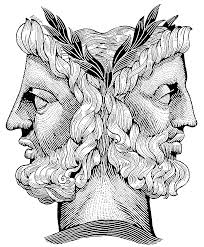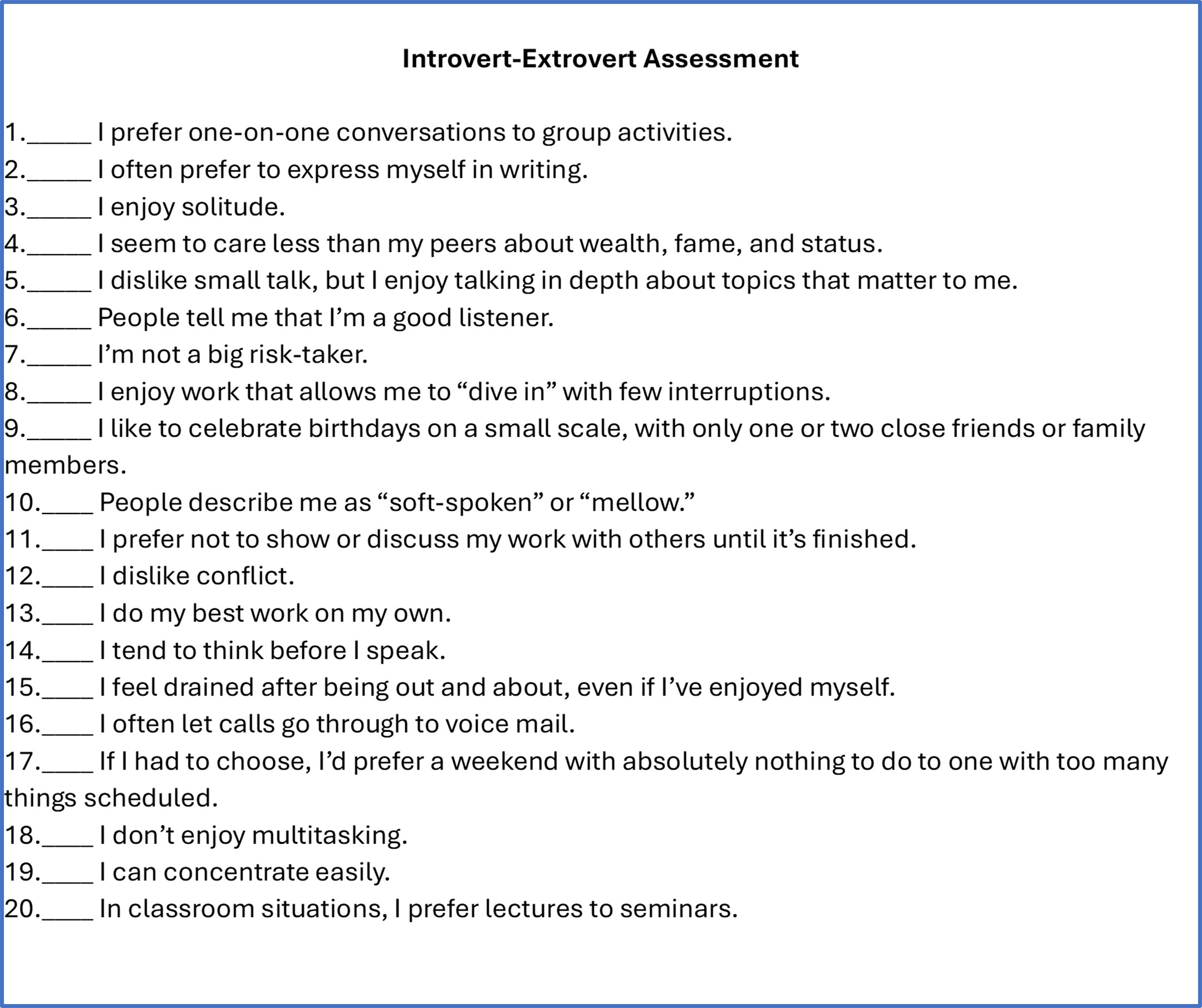Quiet - The Power of Introverts; Individuality versus mutuality
May 06, 2024In this newsletter:
- Quiet - The Power of Introverts
- Janus, the god
- Individuality versus mutuality
- Calm, not speed
“In quietness and in confidence shall be your strength.”
-Isaiah 30:15
“Peter, you’re a loner.”
When I was married, my wife said that to me more than once. She didn't mean it as a compliment, but that’s okay. I've always loved solitude.
When the weekends rolled around, I was exhausted from the workweek, spending much of the time flying around the country for work. And with four kids, the weekends were packed – errands, neighborhood activities, soccer coach, church schoolteacher, grocery shopping, taxi service, etc.
While I needed alone time to recharge, I tolerated Saturday night dinners with neighbors.
Nice people and everything, but the small talk about their child's seventh grade hockey game wasn't exactly riveting.
I would’ve much rather been at home with a book, or listening to music, or just sitting and thinking. Downtime.
However, as a lot of people know, when you’re working and supporting a family, there’s no time for complaining. You need to make things happen. Step it up.
It's interesting how writing can make you think about yourself.
I used to consider myself an extrovert. Certainly, looking from the outside, I appeared to be one. But it's more likely extroversion was a means for making money and to put on a happy face for socializing.
Maybe I was an imposter, pretending to be an extrovert, trying to live up to what Susan Cain calls the "Extrovert Ideal."
Or perhaps I switched between introvert and extrovert, depending on the call of duty.
I remember feeling guilty about wanting to be alone, like maybe even something was wrong with me.
Now, at my stage of life, I have time to sit and think. To reflect back on career and family life and ask, "wait, who am I again?"
Quiet - The Power of Introverts
All of this makes me think of Susan Cain and her famous book, Quiet: The Power of Introverts in a World That Can't Stop Talking (2013).
In Quiet, she makes a powerful case for how we undervalue introverts, the ones who prefer listening to speaking, who innovate but avoid self-promotion, who prefer working alone over working in teams. In the book, she maps out the rise of the Extrovert Ideal and examines how deeply it penetrates our culture.
I highly recommend her book if you are interested in learning more about yourself and those around you.
Here is her website: Susan Cain.
Thank you, Susan Cain, for helping us appreciate introverts.
She writes:
“The single most important aspect of personality – the ‘the north and south of temperament,’ as one scientist puts it – is where we fall on the introvert-extrovert spectrum. Our place on this continuum influences our choice of friends and mates, and how we make conversation, resolve differences, and show love. It affects the careers we choose and whether or not we succeed at them. It governs how likely we are to exercise, commit adultery, function well without sleep, learn from our mistakes, place big bets in the stock market, delay gratification, be a good leader, and ask what if.”
“We’re told that to be great is to be bold, to be happy is to be sociable. We see ourselves as a nation of extroverts – which means that we’ve lost sight of who we really are. Depending on which study you consult, one-third to one-half of Americans are introverts – in other words, one out of every two or three people you know…If you’re not an introvert yourself, you are surely raising, managing, married to, or coupled with one.”
“So many people pretend to be extroverts. Closet introverts pass undetected on playgrounds, in high school locker rooms, and in the corridors of corporate America.”
The Extrovert Ideal
“It makes sense that so many introverts hide even from themselves. We live with a value system that I call the Extrovert Ideal – the omnipresent belief that the ideal self is gregarious, alpha, and comfortable in the spotlight. The archetypal extrovert prefers action to contemplation, risk-taking to heed-taking, certainty to doubt. He favors quick decisions, even at the risk of being wrong. She works well in teams and socializes in groups. We like to think that we value individuality, but all too often we admire one type of individual – the kind who’s comfortable “putting himself out there.”
“Introversion – along with its cousins sensitivity, seriousness, and shyness – is now a second-class personality trait, somewhere between a disappointment and a pathology. Introverts living under the Extrovert Ideal are like women in a man’s world, discounted because of a trait that goes to the core of who they are. Extroversion is an enormously appealing personality style, but we’ve turned it into an oppressive standard to which most of us feel we must conform.”
Cain says the Extrovert Ideal has been documented in research studies. People who are talkative, and who talk fast and loud are rated as smarter, better-looking, more interesting, more likable. “The voluble are considered smarter than the reticent – even though there’s zero correlation between the gift of gab and good ideas.”
She adds that we make an unfortunate mistake clinging to the Extrovert Ideal. She highlights several quiet and cerebral people “who knew how to tune in to their inner worlds and the treasures to be found there:” Sir Isaac Newton, Albert Einstein, W. B. Yeats, Frederic Chopin, Marcel Proust, George Orwell, Dr. Seuss, Charles Schulz, Steven Spielberg, Larry Page, J. K. Rowling, etc.
Cain quotes Winifred Gallagher:
“The glory of the disposition that stops to consider stimuli rather than rushing to engage with them is its long association with intellectual and artistic achievement.”
In her book, Cain quotes from a member of an email list called “Introvert Retreat:”
“All the comments from childhood still ring in my ears, that I was lazy, stupid, slow, boring. By the time I was old enough to figure out that I was simply introverted, it was a part of my being, the assumption that there is something inherently wrong with me. I wish I could find that little vestige of doubt and remove it.”
Cain said Carl Jung popularized the terms introvert and extrovert as the basis of personality.
Introverts are drawn to the inner world of thoughts and feelings.
Extroverts are drawn to the external life of people and activities.
Introverts focus on the meaning of events around them.
Extroverts plunge into the events.
Introverts recharge their batteries by being alone.
Extroverts need to recharge if they are alone too long.
You have likely heard of the Myers-Briggs personality test, which is based on Jung’s work.
Wikipedia: Myers-Briggs Type Indicator
My Personality Test
Psychologists, according to Cain, tend to agree on several personality characteristics:
Outside stimulation
Introverts prefer less stimulation. Wine with a close friend, a crossword puzzle, or a book are enjoyable.
Extroverts enjoy meeting new people, hitting the slopes, rocking out with music.
Work life
Introverts work more slowly and deliberately. One task at a time. Deep concentration.
Extroverts work fast, make quick decisions, multitask, take risks.
Wealth and fame, money and status
Introverts are relatively immune to the attraction of wealth and fame.
Extroverts seek wealth and fame, enjoying the “thrill of the chase.”
Social life
Social life for Introverts
After a while at a party, they sneak home, into their pajamas.
Prefer smaller social activities with close friends, colleagues, family.
Listen more than talk.
Think before they speak.
Can feel they express themselves better in writing than in conversation.
Dislike conflict.
Avoid small talk in favor of deep conversations.
Social life for Extroverts
Add life to the party and laugh at your jokes.
Are assertive and dominant.
Desire the company of other people. Like almost all the time.
Think out loud, on their feet.
Would rather talk than listen.
Don’t have a loss for words, and can say things they regret saying.
Comfortable with conflict.
Not comfortable with solitude.
Introvert - Extrovert Spectrum
At the end of this newsletter, I have reproduced Cain's questionnaire that assesses where one falls on the Introvert-Extrovert Spectrum. I encourage you to have a look at that. My answers unequivocally reveal an introvert orientation.
Looking back on my life - work, social, and family - I'm inclined to believe I have the tendency to shift between introvert and extrovert tendencies depending on the context, evoking the image of the god Janus.
On the threshold, looking in, looking out, going in, going out.
Janus – Introvert or Extrovert

If we become too attached to the external, our interiority may torment us; this is true for both introverts and extroverts.
Balancing at the threshold, we need to listen from both the inside as well as the outside.
Introverts need more time inside. The place they go, to sit, chill, contemplate, cogitate, meditate.
Behind the external façade of image and distraction, there's a divine duty to listen from the inside. I think introverts do this better than extroverts.
Individuality and Mutuality
Balancing introversion versus extroversion dispositions calls to mind the balancing of individuality versus mutuality in relationships.
It's like we have two selves: the coupling, mingling self and the explorer, adventurer self.
Two opposing forces:
- Mutuality - toward the known, comfort, intimacy, attached to another and mother, safety of fusion
- Individuality - toward the unknown, freedom, independence, exploration, to travel alone
Kahlil Gibran - On Marriage
Balancing individuality and mutuality is what Kahlil Gibran (1883-1931) explores with his poetic gift in his popular classic The Prophet.
“Let there be spaces in your togetherness,
And let the winds of the heavens dance between you.
Love one another but make not a bond of love:
Let it rather be a moving sea between the shores of your souls.
Fill each other’s cup but drink not from one cup.
Give one another of your bread but eat not from the same loaf.
Sing and dance together and be joyous, but let each one of you be alone,
Even as the strings of a lute are alone though they quiver with the same music.
Give your hearts, but not into each other’s keeping.
For only the hand of Life can contain your hearts.
And stand together, yet not too near together:
For the pillars of the temple stand apart,
And the oak tree and the cypress grow not in each other’s shadow.”
Conclusion
I opened this newsletter with:
“In quietness and in confidence shall be your strength.”
-Isaiah 30:15
It comes from the May 10 entry from the book God Calling. Here is the full prayer:
Calm – Not Speed
“All agitation is destructive of good. All calm is constructive of good, and at the same time destructive of evil.
When man wants evil destroyed, so often he rushes to action. It is wrong. First be still and know that I am God. Then act only as I tell you. Always calm with God. Calm is trust in action. Only trust, perfect trust can keep one calm.
Never be afraid of any circumstances or difficulties that help you to cultivate this calm. As the world, to attain, has to learn speed, you, to attain, have to learn calm. All great work for Me is done first in the individual soul of the worker.”
Introvert - Extrovert Spectrum
Here are Susan Cain's Introvert-Extrovert Assessment questions.
"This is an informal quiz, not a scientifically validated personality test. The questions were formulated based on characteristics of introversion often accepted by contemporary researchers. The more often you answered 'true,' the more introverted you probably are. If you found yourself with a roughly equal number of 'true' and 'false' answers, then you may be an ambivert - yes, there really is such a word."

Thank you for reading!
Be well,
Peter Pavlina



